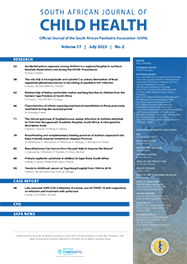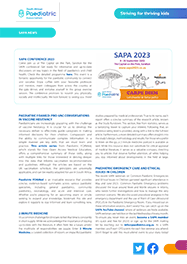Research

Effect of prophylactic phenobarbital on seizures, encephalopathy and mortality in neonates with perinatal asphyxia
Abstract
Objective. To determine the effect of prophylactic phenobarbital on seizures, death and neurological outcome at hospital discharge.
Methods. Neonates with base deficit >16 mmol/l and Apgar score at 5 minutes <7 or requiring resuscitation for >5 minutes at the time of birth were randomised to prophylactic phenobarbital 40 mg/kg (n=50) or placebo (controls) (n=44) within the first 6 hours of life. They were monitored for clinical seizures, hypoxic ischaemic encephalopathy (HIE) and mortality.
Results. Seizures developed in 30.0% of the phenobarbital group as opposed to 47.7% of the control group (relative risk 0.63; 95% confidence interval -0.37 - 1.06; p=0.083). The proportions of patients who had died and/or had HIE II or III at time of discharge from hospital were similar in the two groups (42.0% v. 45.5%). There were no differences in mortality between the two groups (14.0% v. 15.9%).
Conclusion. In infants with asphyxia, prophylactic phenobarbital does not reduce the incidence of seizures, HIE and mortality.
Authors' affiliations
S Velaphi, Department of Paediatrics, Faculty of Health Sciences, University of the Witwatersrand, Johannesburg
M Mokhachane, Department of Paediatrics, Faculty of Health Sciences, University of the Witwatersrand, Johannesburg
R Mphahlele, Department of Paediatrics, Faculty of Health Sciences, University of the Witwatersrand, Johannesburg
E Beckh-Arnold, Department of Human Genetics, National Laboratory Health Services, Johannesburg
Keywords
Cite this article
Article History
Date published: 2013-01-22
Article Views
Full text views: 11419

.jpg)



Comments on this article
*Read our policy for posting comments here